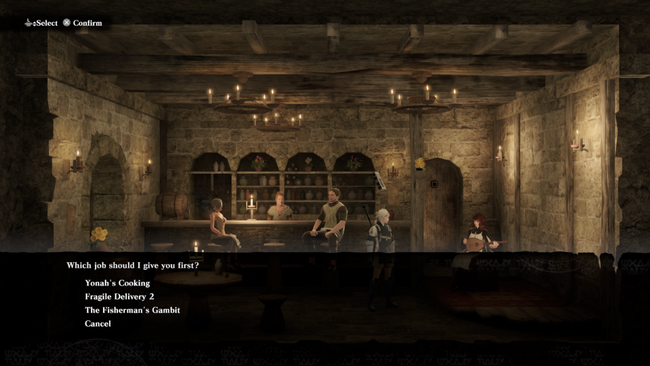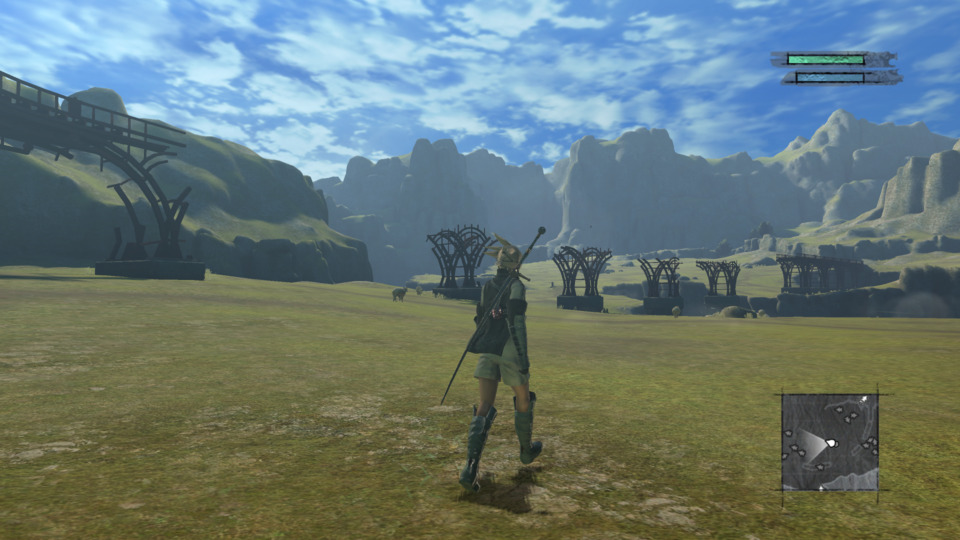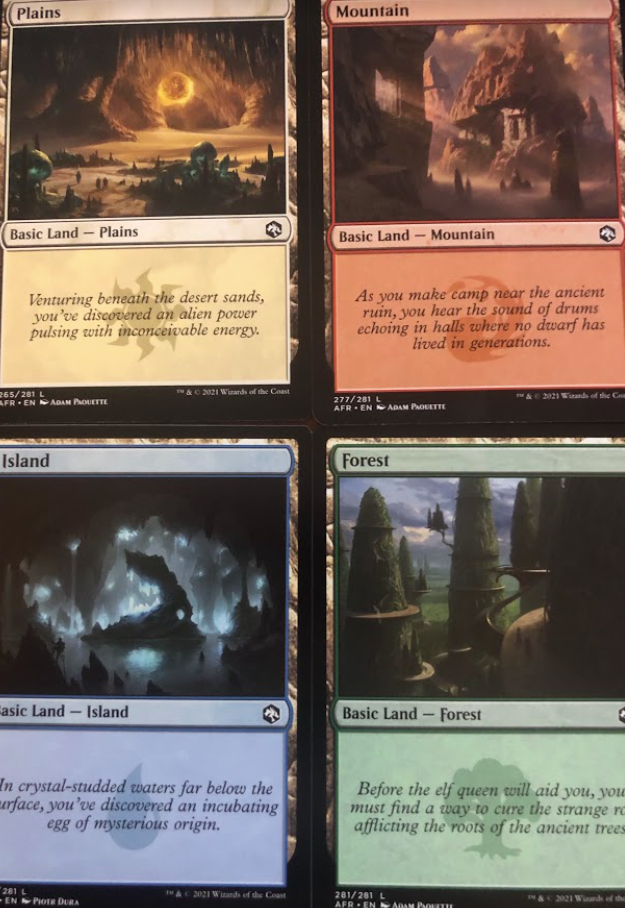Cohen Edenfield writes games and plays them. You can find them on Twitter, Twitch, and Youtube. They have a Master’s degree in literature in a landfill somewhere.
I played more games than usual in 2021, just like I did in 2020, for the extremely obvious reason that we’re living in what threatens to be a forever-plague. Desperate as I was for distraction, it seems strange to judge games for how “good” they were. Any game that got me to stop thinking about the circumstances of our shared existence for longer than a few minutes gets a 10/10 from me. I was an easy A.
That caveat aside, some discrete elements of the new games I played this year have managed to stick in my head for weeks and even months after I put them down. My list is an attempt to explore and examine these things. Some of them impressed me, some delighted me, and some of them pissed me off, but they’re all still on my mind. Given the state of my mind these days, that’s quite the accomplishment.
Nier: Replicant Ver. 1.22’s intentional tedium
Nier Automata is a 2017 Yoko Taro game I connected with on a “Matrix plug that goes into the back of my head” level. Everything about its melancholic, decaying world drew me in. And the questions it asked! What, exactly, constitutes a post-apocalypse? If the world ends so hard that only steel and concrete survive, but so much time passes that another world grows up around it, is it still the post-apocalypse? Aren’t we living in the post-apocalypse of the Aztecs, the ancient Greeks, the Neanderthals? What is a robot? What is a soul? Does the steppy robot lady have an Onlyfans? What is a person? Provocative stuff!
When I finished Automata, I started looking into its 2010 predecessor, Nier, and quickly found out I’d need an Xbox 360 to play it in English. Since mine was freezing in a storage unit on the other side of the country, I gave up hope… until this year! Remakes, baby! Everything old is new again, and that includes video games that are boring on purpose. If you make it through this list, you’ll see I’m not easily bored. Nier: Replicant Ver. 1.22 sees my infinite patience and responds “we’ll fucking see.”

Nier: Replicant Ver. 1.22 is stuffed with intentionally tedious, repetitive sidequests, ostensibly as a criticism of other games stuffed with tedious, repetitive sidequests. Most of them are simple fetch quests where the only difficulty comes from travelling across the enormous, empty landscape, occasionally harried by easily-defeated shadow creatures (fast travel is limited, and only becomes available in the second half of the game, at which point the player is locked out of completing most of the sidequests). As you complete these errands, a pedantic living book bobs along in the air behind you, mocking you for your easily-exploited altruism. The rewards for completing these quests are largely useless: weapons that are usually weaker than those you already have, or gold to buy more useless weapons. Some of the quest-givers do mix things up by requiring a large number of rare-drop materials or by requiring you to kill a monster that has an extremely low chance of even appearing.

And yet! And yet! I did all of them. There’s something very interesting about a game that is up-front about being intentionally boring. The stories the sidequests tell are surprisingly affecting, and the game’s frequent acknowledgement of the tediousness of completion, initially frustrating, begins to feel like encouragement to continue. “I know it sucks, but stick with this. I’m making a point here.” There’s intentional tedium and frustration in a lot of the main story, too. At the time, I kind of hated it. But now, half a year later, I think it was great? Maybe that’s the point being made? Is life a series of arbitrary obligations, loosely chained together by a vague sense of purpose that can only be glimpsed in hindsight? I can’t say, since I still have to beat the entire second half of the game several more times to see the rest of the story. I’ll circle back on this next year.
Magic the Gathering: Arena’s excellent tutorial

2021 saw the release of the Adventures in the Forgotten Realms set of Magic: The Gathering. I saw friends posting pictures of the lands, which come with little D&D-appropriate story hooks.
I had a half-formed idea of using them in D&D – I figured I’d get my players to draw from a stack of them, then send them through a hole in reality to briefly participate in the combat/story beat implied by the text. I went to my local game store (hey, The Deck Box!), got some Adventures in the Forgotten Realms booster packs, and, on a whim, also picked up Planar Portal, a preconstructed Commander deck in the AFR set. Flipping through it, I was entranced by the complex strategies implied by the interaction of the cards. Vaxxed to the gills and looking to make more friends in a new city, I decided to attend the store’s “Casual Commander” night. I didn’t actually know how to play Magic, but that seemed like a minor hurdle. I just needed a crash course.
Magic the Gathering: Arena seemed like a good fit. And it was! The game has a friendly, engaging tutorial that starts with the basics of playing lands, summoning monsters, and casting spells in semi-scripted duels against bots whose personalities reflect the theme of their decks. Magic is a famously complicated game, but MTGA is dense with helpful hints, highlighting all the cards in a hand that can currently be played, defining keywords like “trample” or “deathtouch” when clicked on, or warning me when I tried to play a card that I might be misunderstanding.
After a couple afternoons with Arena, I felt like I understood the rules well enough to go to the in-person Casual Commander without feeling like a burden to the other people at the table. I’ve gone back week after week, getting to know the other players by their decks and how they played, just like in the tutorial, riding the high of a new special interest and membership in a thriving subculture (word up to the Magic group DM).
I kept playing Arena, primarily because it was the easiest way to play more Magic between the weekly Commander nights. I climbed the ranks in PVP, feeling like a cards genius every time I beat somebody. But all too soon, I ran into decks that I simply didn’t have the right cards to beat, and playing with the starter decks was getting me eaten alive. I didn’t want to pay actual money for digital cardboard cards, so I leaned on the weekly and daily challenges that are Arena’s main source of “free” cards. These challenges gradually became an obligation. Whenever I didn’t complete them, well, shit. That was like throwing cards away! And I needed cards. I needed cards so I could beat people in PVP, so I could get more cards, so I could beat people in PVP, so I could…etc. I wasn’t even enjoying playing anymore. I just had to win, and when I lost, I felt like I was getting robbed. Totally healthy mindset, right? Very healthy.
